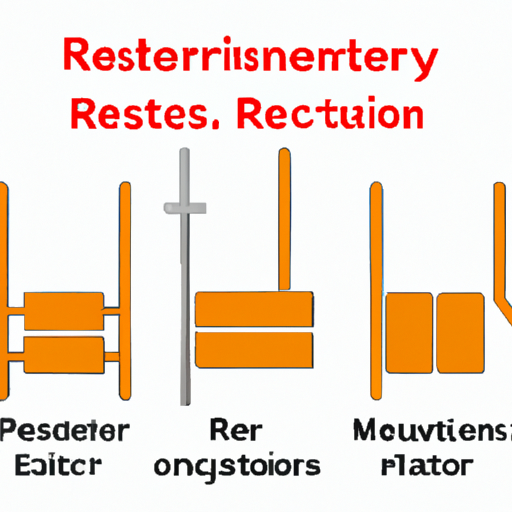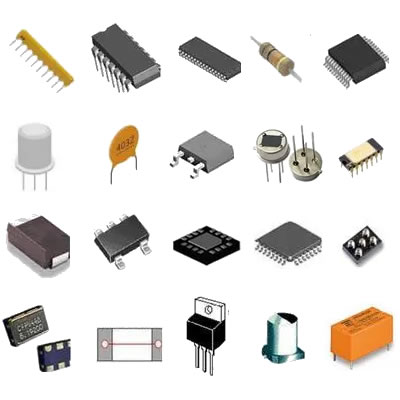What Industries Are the Application Scenarios of Resistor 4 Included In?
I. Introduction
In the world of electronics, resistors play a crucial role in controlling the flow of electric current. Among the various types of resistors, Resistor 4 stands out due to its unique specifications and versatility. This blog post will explore the significance of Resistor 4, its technical characteristics, and the diverse industries that leverage its capabilities. Understanding the application scenarios of Resistor 4 can provide insights into its importance in modern technology.
II. Understanding Resistor 4
A. Technical Specifications and Characteristics
Resistor 4 is defined by several key specifications that determine its performance in electronic circuits:
1. **Resistance Value**: The resistance value of Resistor 4 is typically measured in ohms (Ω) and can vary widely depending on the application. This value dictates how much current will flow through the resistor when a voltage is applied.
2. **Power Rating**: The power rating indicates the maximum amount of power the resistor can dissipate without being damaged. This is crucial for ensuring that the resistor operates safely within its limits.
3. **Tolerance Levels**: Tolerance refers to the degree of variation in the resistance value. A lower tolerance level means a more precise resistor, which is essential in applications requiring high accuracy.
B. Types of Resistor 4
Resistor 4 comes in various forms, each suited for specific applications:
1. **Fixed Resistors**: These resistors have a constant resistance value and are commonly used in circuits where a specific resistance is required.
2. **Variable Resistors**: Also known as potentiometers, these allow users to adjust the resistance value, making them ideal for applications like volume controls in audio equipment.
3. **Specialty Resistors**: These include thermistors and photoresistors, which change resistance based on temperature or light exposure, respectively. They are used in specialized applications such as temperature sensing and light detection.
III. Application Scenarios of Resistor 4
Resistor 4 finds applications across a wide range of industries, each benefiting from its unique properties.
A. Consumer Electronics
The consumer electronics sector is one of the largest markets for Resistor 4.
1. **Smartphones and Tablets**: Resistor 4 is integral to the functioning of smartphones and tablets, where it helps manage power distribution and signal integrity. It ensures that components operate within safe limits, enhancing device longevity.
2. **Home Appliances**: In home appliances like washing machines and microwaves, Resistor 4 is used in control circuits to regulate functions and improve energy efficiency.
3. **Audio and Video Equipment**: Resistor 4 plays a vital role in audio and video equipment, where it helps in signal processing and amplification, ensuring high-quality sound and image output.
B. Automotive Industry
The automotive industry has increasingly integrated advanced electronics, making Resistor 4 essential.
1. **Engine Control Units (ECUs)**: Resistor 4 is used in ECUs to monitor and control engine performance, optimizing fuel efficiency and reducing emissions.
2. **Infotainment Systems**: In modern vehicles, Resistor 4 is crucial for infotainment systems, managing audio signals and ensuring seamless connectivity with smartphones.
3. **Safety and Navigation Systems**: Resistor 4 contributes to the functionality of safety features like anti-lock braking systems (ABS) and navigation systems, enhancing overall vehicle safety.
C. Telecommunications
The telecommunications industry relies heavily on Resistor 4 for various applications.
1. **Network Equipment**: Resistor 4 is used in routers and switches to manage signal integrity and prevent data loss during transmission.
2. **Signal Processing**: In signal processing applications, Resistor 4 helps filter and amplify signals, ensuring clear communication.
3. **Wireless Communication Devices**: Resistor 4 is integral to the functioning of wireless devices, where it helps manage power levels and signal strength.
D. Industrial Automation
In industrial automation, Resistor 4 plays a critical role in enhancing efficiency and reliability.
1. **Robotics**: Resistor 4 is used in robotic systems to control motors and sensors, enabling precise movements and actions.
2. **Control Systems**: In control systems, Resistor 4 helps regulate voltage and current, ensuring stable operation of machinery.
3. **Sensors and Actuators**: Resistor 4 is essential in sensors and actuators, where it helps convert physical signals into electrical signals for processing.
E. Medical Devices
The medical industry utilizes Resistor 4 in various applications, ensuring safety and accuracy.
1. **Diagnostic Equipment**: Resistor 4 is used in diagnostic devices like ECG machines, where it helps in signal processing and data accuracy.
2. **Monitoring Devices**: In patient monitoring systems, Resistor 4 ensures reliable data transmission, critical for patient care.
3. **Therapeutic Equipment**: Resistor 4 is also found in therapeutic devices, where it helps regulate power and ensure safe operation.
F. Renewable Energy
As the world shifts towards renewable energy, Resistor 4 plays a vital role in this transition.
1. **Solar Inverters**: Resistor 4 is used in solar inverters to manage power conversion and ensure efficient energy transfer.
2. **Wind Turbine Controllers**: In wind energy systems, Resistor 4 helps regulate power output and maintain system stability.
3. **Energy Storage Systems**: Resistor 4 is essential in energy storage systems, where it helps manage charging and discharging cycles.
IV. Case Studies
A. Consumer Electronics: The Role of Resistor 4 in Smartphones
In smartphones, Resistor 4 is crucial for managing power distribution among various components. For instance, it helps regulate the voltage supplied to the processor, ensuring optimal performance without overheating. Additionally, it plays a role in signal integrity, allowing for clear communication between the device and cellular networks.
B. Automotive Applications: Enhancing Safety with Resistor 4
In the automotive sector, Resistor 4 is integral to safety systems. For example, in anti-lock braking systems (ABS), it helps monitor wheel speed and prevent skidding by adjusting brake pressure. This application not only enhances safety but also improves overall vehicle performance.
C. Telecommunications: Signal Integrity and Resistor 4
In telecommunications, maintaining signal integrity is paramount. Resistor 4 is used in network equipment to filter and amplify signals, ensuring that data is transmitted without loss. This application is critical for maintaining high-speed internet connections and reliable communication.
V. Future Trends and Innovations
A. Advancements in Resistor Technology
As technology evolves, so does resistor technology. Innovations such as thin-film resistors and high-precision resistors are emerging, offering improved performance and reliability.
B. The Impact of IoT on Resistor Applications
The Internet of Things (IoT) is driving demand for more sophisticated resistors. As devices become interconnected, the need for precise and reliable resistors will continue to grow, leading to new applications and designs.
C. Sustainability and Eco-Friendly Resistor Designs
With increasing awareness of environmental issues, there is a push for sustainable resistor designs. Manufacturers are exploring eco-friendly materials and production methods to reduce the environmental impact of resistors.
VI. Conclusion
Resistor 4 is a fundamental component in a wide array of industries, from consumer electronics to renewable energy. Its unique specifications and versatility make it indispensable in modern technology. As industries continue to evolve, the role of Resistor 4 will only become more significant, driving innovation and enhancing performance across various applications. Understanding its importance can help us appreciate the intricate workings of the technology we rely on daily.
VII. References
1. Academic journals on electronics and resistor technology.
2. Industry reports on the applications of resistors in various sectors.
3. Technical manuals and datasheets from resistor manufacturers.
This comprehensive exploration of Resistor 4 highlights its critical role across multiple industries, showcasing its versatility and importance in the ever-evolving landscape of technology.





